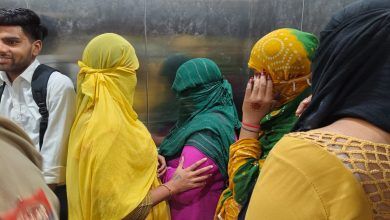“Hindus in Crisis, Western UP Feels Like Mini Pakistan”: Swami Rambhadracharya Sparks Debate in Meerut
Meerut, Uttar Pradesh | September 13, 2025
A sharp political and social debate has ignited after Tulsi Peethadheeshwar Jagadguru Swami Rambhadracharya declared that Hindus in India are facing a crisis, claiming that in western Uttar Pradesh it feels like a “mini Pakistan.” The spiritual leader made these remarks during his visit to Meerut, urging Hindu families to establish religious schools in every home to safeguard cultural identity.
Rambhadracharya’s Statement
Swami Rambhadracharya, a respected Hindu spiritual leader known for his work on Ramcharitmanas and social upliftment projects, addressed a gathering in Meerut where he highlighted what he described as the “growing demographic and cultural imbalance” in western Uttar Pradesh.
“Hindus are in crisis today. When one comes to western Uttar Pradesh, it feels like a mini Pakistan. To protect our traditions and ensure future generations remain rooted in Sanatan Dharma, every Hindu household must establish religious schools,” he said.
The Context: Western UP’s Communal Tensions
Western Uttar Pradesh has historically been a sensitive belt, often witnessing communal polarization. The statement is being viewed not just as a call for cultural consolidation but also as a reflection of deep-rooted insecurities among communities.
Political observers note that references to “mini Pakistan” have long been part of the political vocabulary in the region, often invoked during election campaigns to highlight religious and demographic shifts. Rambhadracharya’s comments, however, carry additional weight given his stature as a spiritual figure rather than a politician.
Reactions and Implications
While his followers and sections of the Hindu community lauded the call to set up religious schools as a way of cultural preservation, critics argued that such remarks could further polarize society. Social activists in Meerut warned that framing western UP as “mini Pakistan” risks deepening mistrust between communities who have coexisted in the region for generations.
A Larger National Narrative
Rambhadracharya’s remarks also resonate with a broader national discourse where religious identity and education have increasingly intersected with politics. The call for “religious schools in every home” echoes past campaigns that emphasized gurukuls and Vedic learning as alternatives to modern secular education, particularly in regions experiencing cultural anxiety.
For now, Meerut has become the epicenter of a debate over identity, education, and religious coexistence—a debate that is expected to reverberate across the state and the country.



